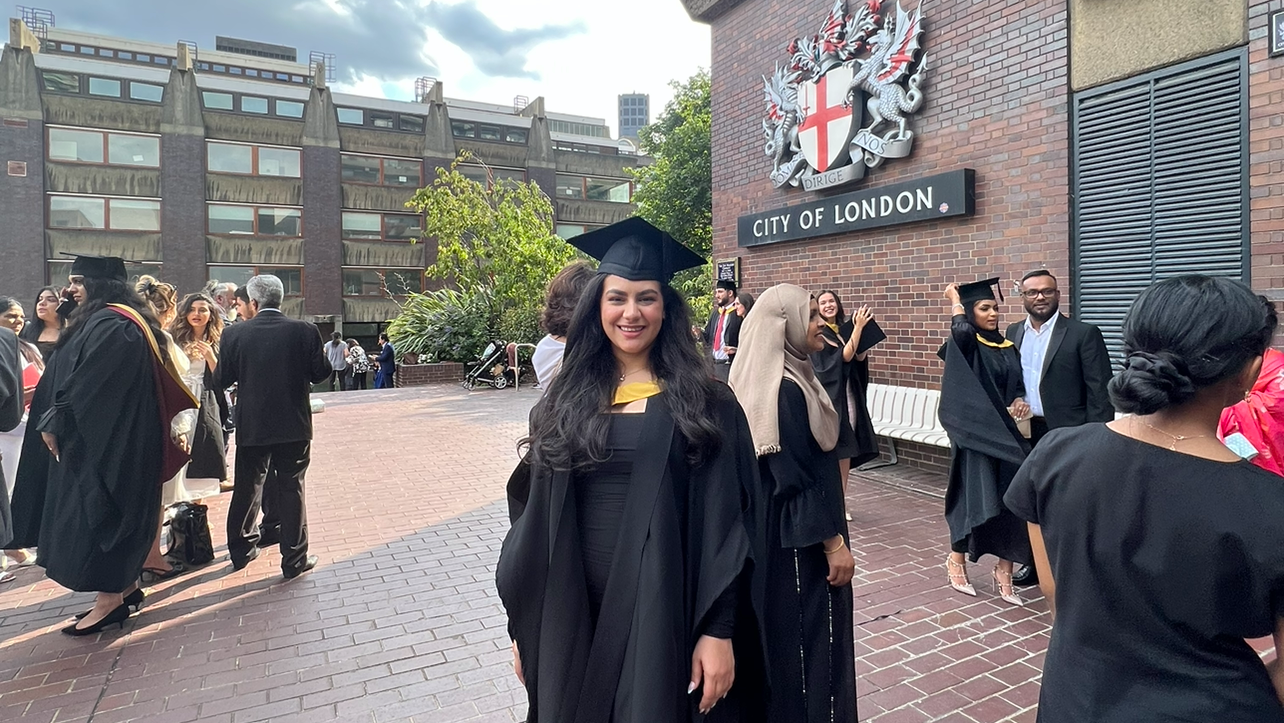A global learning experience: UofGH’s partnership with London’s City Law School lets aspiring lawyers gain international perspectives, earn a law degree in just two years
Attending a one-hour information session at the University of Guelph-Humber (UofGH) about applying to London’s City Law School could change a curious student’s life forever.
Through a partnership established in 2015 between the University of Guelph-Humber and the City Law School, students in any program have the chance to apply in their final year to the esteemed law school in London, England – without having to write the Law School Admission Test (LSAT)!
Why City Law School?
UofGH Business alum (class of 2019) and City Law School graduate Sean-Robert Clayton said he wasn’t initially considering law school because he had plans to earn his Master of Business Administration degree upon completing his undergrad. After developing an inquisitive interest in law school, he “fell in love with the law” and decided to apply to City Law School to pursue a legal education. Clayton is now studying for his bar exams, with dreams of practising criminal and business law.
“I wanted to have experience in more than one country to have the possibility in the future of broadening my horizon,” Clayton said about his decision to study in London.
In fact, UofGH entered the partnership with the City Law School, specifically because of the appeal London has to prospective students (a foreign city to explore, where English is the main language, like Toronto) and the school’s prestigious reputation, Guelph-Humber Associate Vice-Provost George Bragues said.
The decision to study law in England was also appealing to UofGH Justice Studies alum (class of 2019) and City Law School graduate Sandra Makary, who is aspiring to become in-house legal counsel for a company.
“I love Europe, and I wanted the opportunity to see it. I really did consider the fact that we [in Canada] were originally a British colony, so a lot of our laws were very much strongly based on the U.K.'s laws, and I wanted to see how that was different from here,” Makary said. “I thought that would be a very good global experience for me.”
Attending the City Law School through this partnership as an international student means meeting people from around the world, whether they’re instructors or other classmates. When Clayton and Makary attended the City Law School, they met peers of different ages, with a variety of backgrounds from a multitude of cities.
“There were people in that class who were doctors, or they were on city councils, or their field that they're interested in was very niche, like fashion law. And then there are people that their interests were so far out of law, like tarot reading!” Makary said. Exposure to new ways of thinking is something students can get out of studying law abroad.
Being exposed to a different culture can enrich students’ perspectives, too. Clayton said he was surprised to see going out for drinks with instructors after class wasn’t out of the norm.
Interested in applying?
With an honours bachelor’s degree from UofGH, Guelph-Humber students can earn their LL.B in just two years, rather than the standard three years, starting with year-two courses. To be admitted, applicants require a minimum 3.0 GPA or a B average. And good grades are rewarded – for UofGH students accepted with a cumulative average of at least 73%, they’re eligible for a 10% discount on tuition.
“[The City Law School] knows that our students are well-equipped to be able to manage the stress of being a student in a second-year program, so they allow them to finish in two years instead of three,” UofGH Career Services Coordinator – Justice, Kinesiology & Psychology, Elizabeth Hawley, said.
The pathway to becoming practising lawyer in Canada
Coming back to Canada with an LL.B doesn’t mean a law school graduate is a lawyer – yet. As a former international student holding an LL.B. versus a J.D. (the degree given by Canadian law schools), graduates are required to take accreditation exams to prove their knowledge is equivalent to that of Canadian institutions through the National Committee of Accreditation. Only afterwards could students take their bar exams to become a lawyer, in addition to articling.
A student’s grades dictate how many exams they write – between five to 12. These are online written exams that take about three-and-a-half hours to complete. Makary wrote six, choosing to do one per month because she was working full time. A great benefit is students can take these at their own pace.
Clayton’s advice? “It's pretty straightforward. As long as you're disciplined and treat it like a law school course, you'll get through it fine.”
But this isn’t the only path. Aspiring lawyers have the option to instead complete “assigned subjects” at a Canadian law school.
What’s the LL.M program?
Guelph-Humber students can also decide to pursue an LL.M through the City Law School partnership – and our alum and Justice Studies instructor Vic Duarte is a shining example of this success. This Masters program is different because it’s online, but students cannot become lawyers with this degree alone.
Your honour, sign me up!
“I ended up choosing City because I knew that we had a partnership with that school, which did appeal to me because I picked Guelph-Humber [for undergrad]. So I believe that any school that Guelph-Humber would choose to affiliate with would be just as good of an education, right? If not better,” Makary said.
To learn more about the partnership, click here.
And to view the City Law School’s website, click here.



